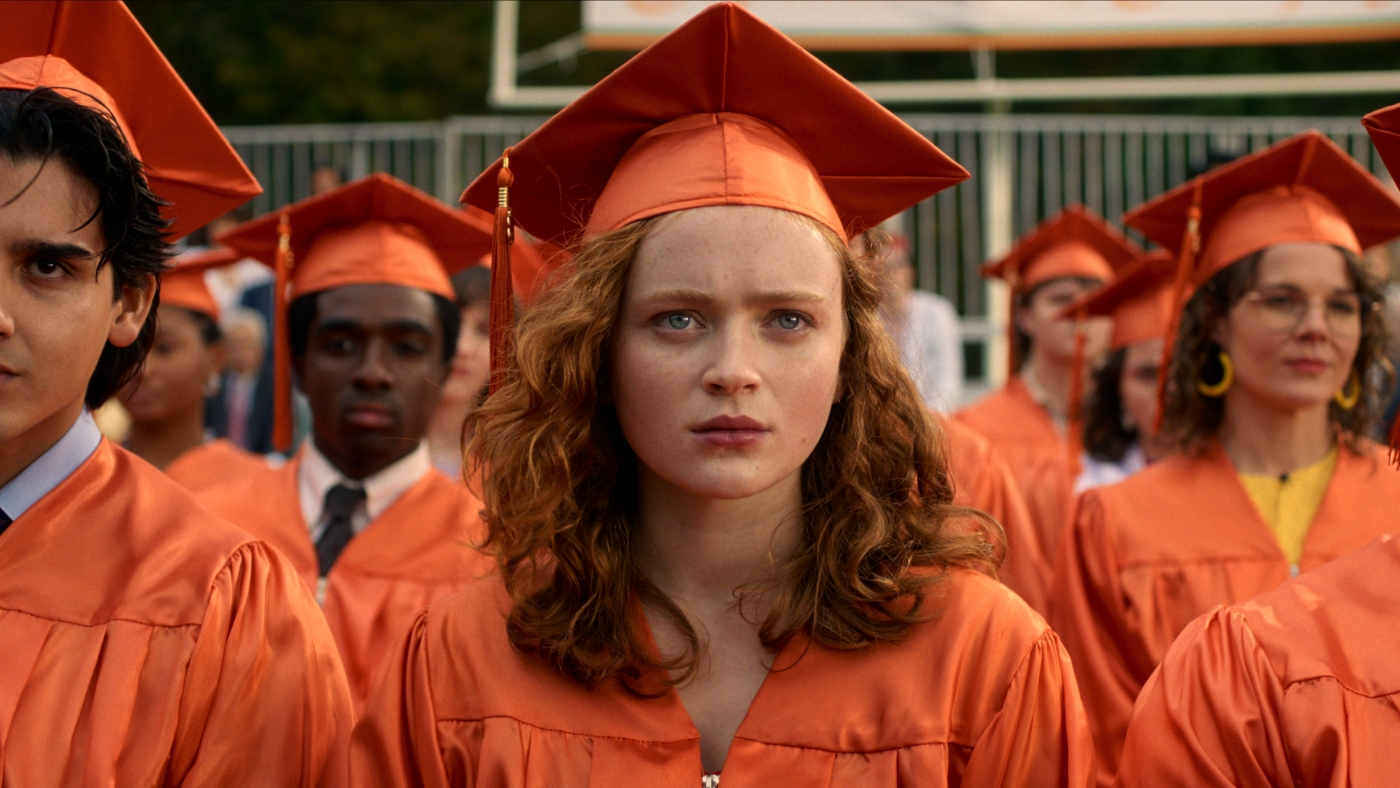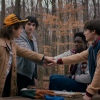Lifestyle
See Angelina Jolie, Nicole Kidman and More at W Magazine’s Golden Globes Party

In the movie “The Substance,” Demi Moore plays an entertainer in her 50s so intent on hanging onto stardom that she signs up to take a potion that will restore her youth, but at a horrific price.
“This is more joyous,” Ms. Moore said of the beautification process leading up to W Magazine’s Golden Globes party held on Saturday evening, the night before the ceremony, in a top floor suite of the Chateau Marmont hotel in West Hollywood.
She was decked out in a black and white polka-dot dress from Nina Ricci as she stood in a tented area where the smell of cigarette smoke was surprisingly strong and household-name celebrities and fellow Globe nominees were everywhere.
The party, co-hosted by W’s Magazine’s editor in chief Sara Moonves, and its editor at large, Lynn Hirschberg, was celebrating the magazine’s annual Best Performances issue, and the walls were covered with enlarged photographs of the featured celebrities.
On one side of the room, the real-life Nicole Kidman stood underneath a giant image of the actor Daniel Craig, nominated for a Globe for his role in the movie “Queer.” On the other side, the real-life Mr. Craig, in a pair of tinted glasses, a black shirt and wide trousers, stood beneath a giant image of Ms. Kidman, who was nominated for her part in the film “Babygirl.”
“Not a bad year,” someone said to Ms. Kidman as she made her way through the crowd with her daughter Sunday Rose Kidman-Urban.
“Not a bad year, indeed,” Ms. Kidman said as a DJ played Blondie’s Rapture while Sabrina Carpenter and Cynthia Erivo shimmied by.
Did Ms. Erivo, who is up for a Globe for the film “Wicked,” have an outfit picked out for the next evening?
Of course she did.
“LV,” she said, by which she meant Louis Vuitton. Nicolas Ghesquière, the artistic director women’s collections at the brand, happened to be out on the terrace, a few yards from Ms. Moore and within spitting distance of Angelina Jolie, a nominee for her performance in the film “Maria,” in which she plays the opera diva Maria Callas.
She seemed to be the only attendee who had a handler stopping photographers from taking pictures of her. But a moratorium on her moratorium took place when Ms. Moonves ambled over to say hello and to politely make it clear that, for history’s sake, the moment would be captured.
Kevin Mazur, a celebrity photographer for Getty Images, raced through the crowd with his camera. The pop stars Charli XCX and Ms. Carpenter huddled together with the model and actress Cara Delevingne.
By 10 p.m., the place was so crowded that the designer Christian Louboutin realized he was going to have to leave the penthouse suite for his room elsewhere in the hotel.
But only for a moment.
“I have to pee!” he said.
“You can get in but you can’t get out,” said Pamela Anderson, who was by the door, hoping to make an exit.
And who could blame her?
After all, Ms. Anderson is featured in the magazine’s issue and is nominated for a Globe for her role in the film “The Last Showgirl.”
Clearly, she had a full weekend ahead of her, although so did the celebrity stylist Law Roach, who seemed to have no interest in leaving.
What was his client Zendaya, nominated for the movie “Challengers,” wearing to the awards the next evening?
“Vuitton,” he said, adding that the jewelry would be Bulgari and that the whole look would be inspired by Joyce Bryant, the glamorous Black singer of the 1940s and ’50s who broke racial barriers in nightclubs.
A few feet away, Eddie Redmayne, nominated for his role in the television series, “The Day of the Jackal,” was hanging out with Andrew Garfield, who is scheduled to present at the Globes.
Colman Domingo, nominated for his part in the movie “Sing Sing,” mingled with Tilda Swinton, nominated for her role in the film “The Room Next Door,” and then headed to the dance floor around the time that DJ Ross One began pumping Shannon’s “Let the Music Play.”
Around 11:30 p.m., the party was still going strong. Waiters paraded around the room with chocolate truffles and French fries.
Kevin Bacon, with his wife, Kyra Sedgwick, was by one of the sofas inside the suite wearing a blazer and a vintage Iron Maiden T-shirt. It was one of only a few outfits not selected by a stylist.
“My son got it for me for Christmas,” he said.

Lifestyle
Sunday Puzzle: New newsmakers of 2025

On-air challenge
Every year around this time I present a “new names in the news” quiz. I’m going to give you some names that you’d probably never heard before 2025 but that were prominent in the news during the past 12 months. You tell me who or what they are.
1. Zohran Mamdani
2. Karoline Leavitt
3. Mark Carney
4. Robert Francis Prevost (hint: Chicago)
5. Jeffrey Goldberg (hint: The Atlantic)
6. Sanae Takaichi
7. Nameless raccoon, Hanover County, Virginia
Last week’s challenge
Last week’s challenge came from Joseph Young, of St. Cloud, Minn. Think of a two-syllable word in four letters. Add two letters in front and one letter behind to make a one-syllable word in seven letters. What words are these?
Challenge answer
Ague –> Plagued / Plagues / Leagues
Winner
Calvin Siemer of Henderson, Nev.
This week’s challenge
This week’s challenge is a numerical one from Ed Pegg Jr., who runs the website mathpuzzle.com. Take the nine digits — 1, 2, 3, 4, 5, 6, 7, 8, 9. You can group some of them and add arithmetic operations to get 2011 like this: 1 + 23 ÷ 4 x 5 x 67 – 8 + 9. If you do these operations in order from left to right, you get 2011. Well, 2011 was 15 years ago. Can you group some of the digits and add arithmetic symbols in a different way to make 2026? The digits from 1 to 9 need to stay in that order. I know of two different solutions, but you need to find only one of them.
If you know the answer to the challenge, submit it below by Thursday, January 8 at 3 p.m. ET. Listeners whose answers are selected win a chance to play the on-air puzzle.
Lifestyle
Daniel Tosh Sells Lake Tahoe Estate for $10.75 Million

Daniel Tosh
Sells Lake Tahoe Home for Millions
Published
Daniel Tosh has officially sold his sprawling Lake Tahoe compound but the comedian isn’t leaving the area … TMZ has learned.
Real estate sources tell us the 7-bedroom, 7-bath estate officially closed Friday for $10.75 million, and Tosh bought another property across the lake to be closer to friends, which is why he decided to sell.
The gated estate, located on the pristine west shore between Tahoe City and Sunnyside, sprawls across 1.6 acres and features three distinct homes, each with its own character and charm.
The Upper House is the ultimate entertainer’s dream … 4 bedrooms, 3 baths, elevator, game room, industrial ice cream maker, 4-car garage, hot tub, fire pit, bocce and horseshoe pits, and sprawling lawns with breathtaking lake views.
The Middle House keeps classic Tahoe charm alive with knotty pine interiors, 3 bedrooms, 3 baths, a stone fireplace, skylit kitchen, and steam shower — perfect for unwinding after a day on the lake.
The lakeside cabin is a serene retreat with a studio loft, retro kitchenette, modern bathroom, and French doors opening right onto the lake.
Altogether, the property boasts 93 feet of lake frontage, two buoys, and multiple outdoor spaces for fun and relaxation.
Daniel may be moving, but one thing’s clear … he’s still very much a Lake Tahoe guy, just on the other side of the lake now.
Lifestyle
What worked — and what didn’t — in the ‘Stranger Things’ finale

Sadie Sink as Max Mayfield.
Netflix
hide caption
toggle caption
Netflix
Yes, there are spoilers ahead for the final episode of Stranger Things.
On New Year’s Eve, the very popular Netflix show Stranger Things came to an end after five seasons and almost 10 years. With actors who started as tweens now in their 20s, it was probably inevitable that the tale of a bunch of kids who fought monsters would wind down. In the two-plus-hour finale, there was a lot of preparation, then there was a final battle, and then there was a roughly 40-minute epilogue catching up with our heroes 18 months later. And how well did it all work? Let’s talk about it.
Worked: The final battle
The strongest part of the finale was the battle itself, set in the Abyss, in which the crew battled Vecna, who was inside the Mind Flayer, which is, roughly speaking, a giant spider. This meant that inside, Eleven could go one-on-one with Vecna (also known as Henry, or One, or Mr. Whatsit) while outside, her friends used their flamethrowers and guns and flares and slingshots and whatnot to take down the Mind Flayer. (You could tell that Nancy was going to be the badass of the fight as soon as you saw not only her big gun, but also her hair, which strongly evoked Ripley in the Alien movies.) And of course, Joyce took off Vecna’s head with an axe while everybody remembered all the people Vecna has killed who they cared about. Pretty good fight!
Did not work: Too much talking before the fight
As the group prepared to fight Vecna, we watched one scene where the music swelled as Hopper poured out his feelings to Eleven about how she deserved to live and shouldn’t sacrifice herself. Roughly 15 minutes later, the music swelled for a very similarly blocked and shot scene in which Eleven poured out her feelings to Hopper about why she wanted to sacrifice herself. Generally, two monologues are less interesting than a conversation would be. Elsewhere, Jonathan and Steve had a talk that didn’t add much, and Will and Mike had a talk that didn’t add much (after Will’s coming-out scene in the previous episode), both while preparing to fight a giant monster. It’s not that there’s a right or wrong length for a finale like this, but telling us things we already know tends to slow down the action for no reason. Not every dynamic needed a button on it.
Worked: Dungeons & Dragons bringing the group together
It was perhaps inevitable that we would end with a game of D&D, just as we began. But now, these kids are feeling the distance between who they are now and who they were when they used to play together. The fact that they still enjoy each other’s company so much, even when there are no world-shattering stakes, is what makes them seem the most at peace, more than a celebratory graduation. And passing the game off to Holly and her friends, including the now-included Derek, was a very nice touch.

Charlie Heaton as Jonathan Byers, Natalia Dyer as Nancy Wheeler, Maya Hawke as Robin Buckley, and Joe Keery as Steve Harrington.
Netflix
hide caption
toggle caption
Netflix
Did not work: Dr. Kay, played by Linda Hamilton
It seemed very exciting that Stranger Things was going to have Linda Hamilton, actual ’80s action icon, on hand this season playing Dr. Kay, the evil military scientist who wanted to capture and kill Eleven at any cost. But she got very little to do, and the resolution to her story was baffling. After the final battle, after the Upside Down is destroyed, she believes Eleven to be dead. But … then what happened? She let them all call taxis home, including Hopper, who killed a whole bunch of soldiers? Including all the kids who now know all about her and everything she did? All the kids who ventured into the Abyss are going to be left alone? Perfect logic is certainly not anybody’s expectation, but when you end a sequence with your entire group of heroes at the mercy of a band of violent goons, it would be nice to say something about how they ended up not at the mercy of said goons.


Worked: Needle drops
Listen, it’s not easy to get one Prince song for your show, let alone two: “Purple Rain” and “When Doves Cry.” When the Duffer Brothers say they needed something epic, and these songs feel epic, they are not wrong. There continues to be a heft to the Purple Rain album that helps to lend some heft to a story like this, particularly given the period setting. “Landslide” was a little cheesy as the lead-in to the epilogue, but … the epilogue was honestly pretty cheesy, so perhaps that’s appropriate.
Did not work: The non-ending
As to whether Eleven really died or is really just backpacking in a foreign country where no one can find her, the Duffer Brothers, who created the show, have been very clear that the ending is left up to you. You can think she’s dead, or you can think she’s alive; they have intentionally not given the answer. It’s possible to write ambiguous endings that work really well, but this one felt like a cop-out, an attempt to have it both ways. There’s also a real danger in expanding characters’ supernatural powers to the point where they can make anything seem like anything, so maybe much of what you saw never happened. After all, if you don’t know that did happen, how much else might not have happened?
This piece also appears in NPR’s Pop Culture Happy Hour newsletter. Sign up for the newsletter so you don’t miss the next one, plus get weekly recommendations about what’s making us happy.
Listen to Pop Culture Happy Hour on Apple Podcasts and Spotify.
-

 Entertainment1 week ago
Entertainment1 week agoHow the Grinch went from a Yuletide bit player to a Christmas A-lister
-

 World7 days ago
World7 days agoHamas builds new terror regime in Gaza, recruiting teens amid problematic election
-

 Indianapolis, IN1 week ago
Indianapolis, IN1 week agoIndianapolis Colts playoffs: Updated elimination scenario, AFC standings, playoff picture for Week 17
-

 Southeast1 week ago
Southeast1 week agoTwo attorneys vanish during Florida fishing trip as ‘heartbroken’ wife pleads for help finding them
-

 Business1 week ago
Business1 week agoGoogle is at last letting users swap out embarrassing Gmail addresses without losing their data
-

 World1 week ago
World1 week agoBest of 2025: Top five defining moments in the European Parliament
-

 World1 week ago
World1 week agoSnoop Dogg, Lainey Wilson, Huntr/x and Andrea Bocelli Deliver Christmas-Themed Halftime Show for Netflix’s NFL Lions-Vikings Telecast
-

 News1 week ago
News1 week agoDOJ says it may need a ‘few more weeks’ to finish releasing Epstein files
















